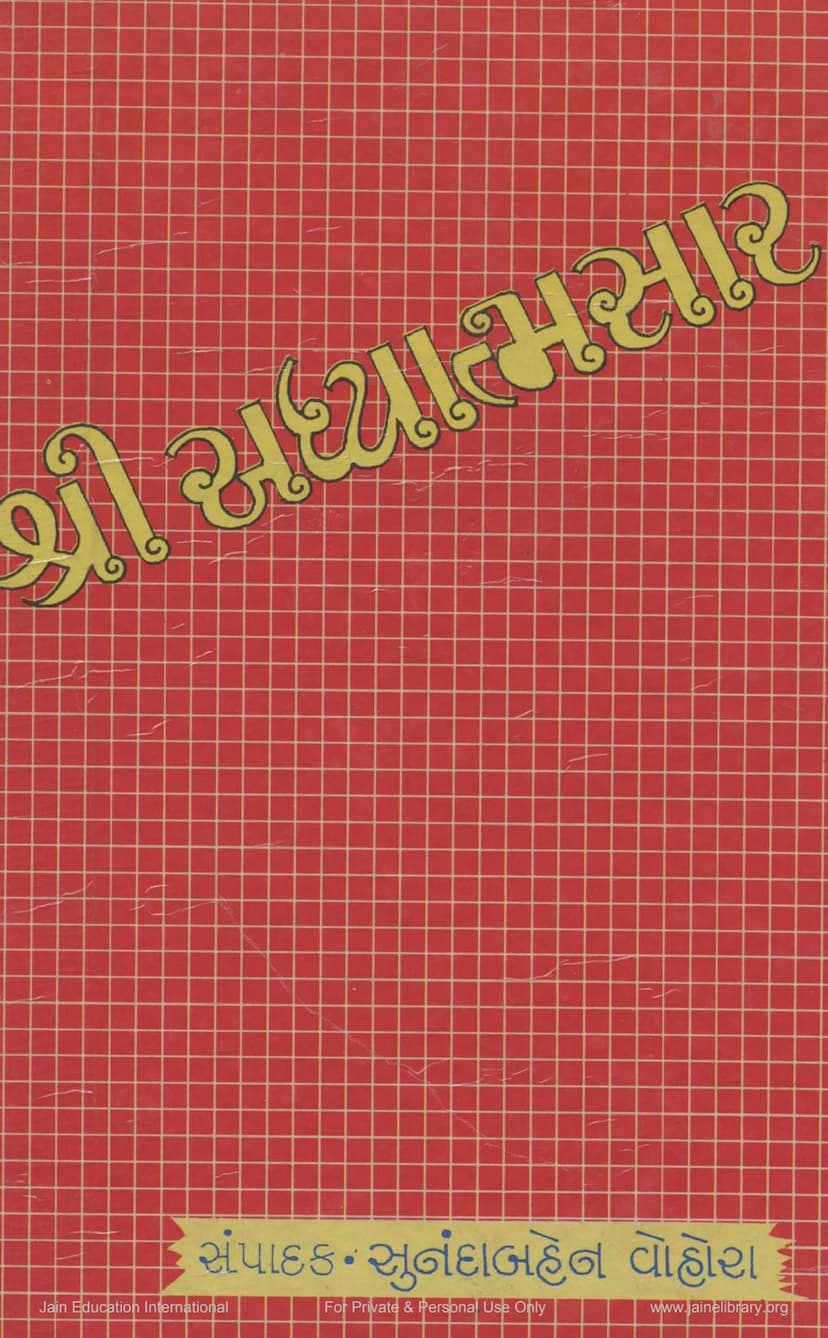Adhyatmasara
Added to library: September 1, 2025

Summary
This is a comprehensive summary of the Jain text "Adhyatmasara" by Sunandaben Vohra, based on the provided Gujarati text. The text focuses on spiritual introspection, self-realization, and the path to liberation, as expounded in Jain philosophy.
Book Title: Adhyatmasara Author: Sunandaben Vohra Publisher: Sunandaben Vohra Catalog Link: https://jainqq.org/explore/004896/1
Overall Summary:
"Adhyatmasara" is a profound Jain text that delves into the essence of spiritual knowledge and practice. Authored by Sunandaben Vohra, the book serves as a Gujarati commentary and translation of the original work by the revered scholar Upadhyaya Yashovijayji Maharaj, particularly focusing on his "Jnanasar" and "Adhyatmasara" scriptures. The text emphasizes that true spiritual purification (chittashuddhi) and the path to liberation are only attainable through "Samayaktva" (Right Faith/Perception), without which even good deeds like charity (dana) cannot lead to salvation. The book aims to make the deep spiritual principles accessible to the common person, enabling them to understand and practice the path to self-realization and liberation from the cycle of birth and death.
Key Themes and Chapters:
The summary highlights the significance of "Adhyatmasara" as a compilation of spiritual wisdom, drawing from numerous Jain and even some non-Jain texts. The book is structured into twenty-one chapters (Adhikars), each focusing on a crucial aspect of the spiritual journey:
- Adhyatma Shastra Mahima (Glory of Spiritual Science): Establishes the importance and profound impact of spiritual scriptures.
- Guru-Shishya Samvad (Dialogue between Guru and Disciple): Explores spiritual concepts through a conversational format.
- Dambh Tyag (Renunciation of Hypocrisy): Warns against pretense and emphasizes the need for genuine spiritual practice.
- Bhav Swarup Chinta-Chintan (Contemplation of the True Nature): Encourages deep thought about the nature of existence and the soul.
- Vairagya Sambhav (The Possibility of Dispassion): Discusses how detachment from worldly pleasures arises.
- Vairagya Bhed (Types of Detachment): Differentiates various forms of detachment.
- Vairagya Vishay (The Subject Matter of Detachment): Explores the objects and reasons for developing detachment.
- Mamata Nirakaran (Eradication of Attachment): Focuses on overcoming possessiveness and attachment.
- Samata Swikar (Acceptance of Equanimity): Promotes the practice of equanimity in all situations.
- Anushthan (Practices/Rituals): Details various spiritual practices and their significance.
- Manahshuddhi Adhikar (Purification of the Mind): Emphasizes the critical role of mental purity in spiritual progress.
- Samakit Adhikar (The Righteous Path): Explains the stages and importance of Samayaktva (Right Faith).
- Mithyatva Tyag (Renunciation of False Beliefs): Addresses the need to abandon incorrect philosophies and superstitions.
- Kadagrah Tyag (Abandoning Dogmatism): Advises against rigid adherence to opinions and promotes open-mindedness.
- Yoga Swarup (The Nature of Yoga): Explains the concept and practice of Yoga.
- Dhyana Swarup (The Nature of Meditation): Delves into the principles and benefits of meditation.
- Dhyana Stuti (Praise of Meditation): Glorifies meditation as a path to spiritual heights.
- Atmanishchay Adhikar (Certainty of the Soul): Focuses on the realization of the true nature of the soul.
- Agam Stuti (Praise of Scriptures): Reveres the sacred Jain scriptures.
- Anubhav Adhikar (The Experience of Reality): Describes the direct experiential realization of the soul.
- Sajjan Prashasti (Praise of the Virtuous): Offers praise and good wishes to the virtuous and knowledgeable.
Key Contributions of Sunandaben Vohra:
The compiler, Sunandaben Vohra, is lauded for her dedication and effort in translating and presenting this profound text in simple Gujarati. Her work is inspired by the commentaries of Pujya Nyas Shri Gambhirvijayji M.S. and the simple translation by Pujya Shri Chandrashekharji M.S. The book also includes blessings and guidance from Acharya Shri Vijay Chandrodayasuri M.S. and Acharya Shri Vijay Kalapurnasuri M.S., adding significant weight and spiritual authority to the work.
The Core Message:
The text "Adhyatmasasra" highlights the rarity and profound significance of spiritual knowledge in the current era (Kaliyug). It presents the spiritual path as a journey of introspection, detachment, and mental purification. The author stresses that true happiness lies not in external possessions or worldly pleasures, which are fleeting and ultimately lead to suffering, but in the realization of the soul's inherent pure and blissful nature. The book guides the reader through the intricacies of spiritual practices, emphasizing the importance of right faith, right knowledge, and right conduct as outlined in Jainism.
The Value of the Text:
The book is considered invaluable for spiritual seekers (mumukshu) as it provides a clear path to overcome inner impurities, faults, and karmic impurities to attain spiritual completeness. The text's inclusion of various philosophical insights and its systematic exploration of concepts like dispassion (vairagya), equanimity (samata), and self-realization (atmajnana) make it a comprehensive guide for spiritual growth. The author's effort to simplify these complex ideas ensures accessibility for a wider audience.